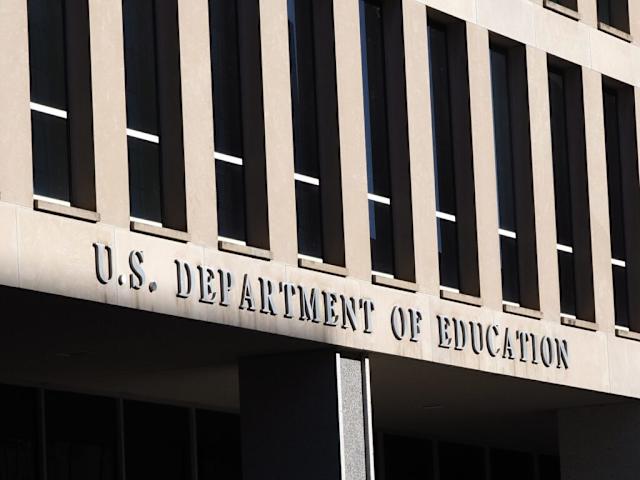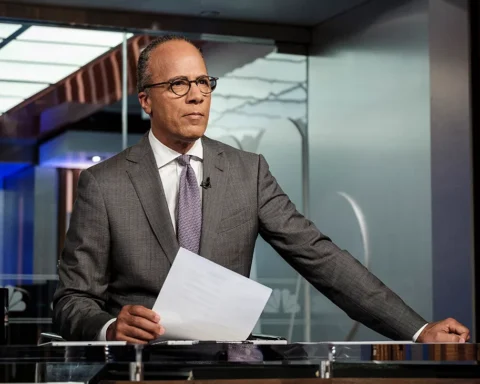President Donald Trump has set his sights on abolishing the U.S. Education Department and has said he’d prefer to put education policy in the hands of the states.
But that may not be so simple, with state officials and lawmakers saying they’re wildly unprepared for such a huge undertaking.
NBC News reported this month that the White House is preparing an executive order to eliminate the agency, though the details of how that would work remain unclear. Trump cannot unilaterally get rid of a federal agency without congressional approval, and his nominee for education secretary, Linda McMahon, agreed at her recent Senate confirmation hearing that they hope to present a plan that Congress will support.
At a Cabinet meeting Wednesday, Trump reiterated his plans for major changes at the agency, saying that “we want to move education back to the states where it belongs.”
Conservatives have for decades circulated an array of ideas on how to abolish or diminish the Cabinet-level agency — plans that include transferring key responsibilities within the department to other federal offices, as well as moving funds and oversight to the states.
Yet, in the absence of specifics, the White House’s broader plan has been met with confusion and big questions from state lawmakers and education officials from both parties who would be tasked with filling in the gaps most likely to arise if and when the department is ended or curtailed.
While some state lawmakers are quietly attempting to develop modest contingency plans, most say they have no choice but to wait for the details to emerge and then scramble to make sure their states can absorb whatever additional responsibilities come their way.
“There’s no solid [federal] plan, so we don’t even know what to plan for,” said Connecticut state Rep. Maryam Khan, a Democrat and a former teacher and local board of education member. “If there’s just an implementation of something, all of a sudden, there’s no way any state can plan that quickly. There would be huge burdens on states to try to figure out something within a very small time frame.”
The largest questions revolve around who would pick up many of the agency’s most crucial responsibilities — among them, the dispersal and oversight of funding for schools with extra needs, including schools with large populations of impoverished students or schools with children with disabilities.
Another major question is how state governments would fill in huge funding gaps for other critical programs the federal agency manages, and whether they’re remotely prepared to jump in if the department is dismantled.
“You can’t just move dollars like that without downstream impacts on individual districts,” said Joshua Cowen, an education policy professor at Michigan State University. “Like rural communities that really rely on the ability to easily, quickly interface with their own state agency and with the U.S. Department of Education to just get what they need, get decisions made, get dollars cleared.”
States could see much more responsibility
In addition to managing the federal student loan portfolio for college students and post-secondary students, the Education Department is charged with distributing millions of dollars in funding for K-12 schools through programs that serve more than 50 million students in almost 100,000 public schools and 32,000 private schools.
That includes funding for thousands of so-called Title I schools — schools that receive federal dollars to help low-income families — as well as for programs that ensure disabled students have access to a free and appropriate public education. In addition, the agency’s Office for Civil Rights enforces laws that aim to prevent discrimination in schools.
The White House has shared little about its plans. Responding to questions about the timing or possible details of a potential executive order regarding the agency, White House spokesperson Harrison Fields said in a statement, “As promised, President Trump will explore options to empower the states, promote educational freedom, prioritize parents over politicians, and restore greatness to our education system.”
A spokesperson for the Education Department didn’t respond to questions about potential changes.
But conservatives have long discussed plans of what they’d like to see happen with the Education Department.
The largest element of some proposals include moving critical functions of the agency to other federal departments. Most prominently, some conservative activists have advocated for transferring federal student loan programs to the Treasury Department (Republican-sponsored U.S. House bills filed last month by Reps. Thomas Massie, of Kentucky, and David Rouzer, of North Carolina, that seek to eliminate the agency propose this) and civil rights enforcement issues in public schools to the Civil Rights Division of the Justice Department.
The concept of abolishing the whole agency was pushed by Project 2025, which also advocated for ending Title I funding in phases. Other advocates for conservative education policy have said the federal government should convert most of the funding it gives to states for K-12 programs into block grants, a form of funding that comes with fewer and less onerous rules and federal oversight.
As a result, state lawmakers are largely anticipating having to figure out how to plan for a number of contingencies, including: How to account for or make up for the spending they rely on for Title I schools and schools that must accommodate students with disabilities; how to manage oversight and accountability for schools that would then get that funding; and whether block grants are in their future.
But in interviews, state lawmakers and education officials made clear that few plans are underway for how states would deal with such a broad new framework.
“Absolutely not,” North Carolina Democratic state Rep. Julie von Haefen said when asked if legislators were preparing for how to react to changes in federal funding for public education or how to deal with a shifting civil rights violation enforcement framework. A former PTA president in Wake County and a current substitute teacher, she focuses her attention in the state House on education issues.
“And in North Carolina, we’re at a really precarious point in our state funding — the loss of federal funding would really be devastating. It’s kind of a perfect storm right now, because last year, we greatly expanded our private school voucher program.” she added.
Iowa state Rep. J.D. Scholten, a Democrat who represents a rural and suburban area around Sioux City, offered a similar assessment of his state’s readiness.
“Not at all,” he said. “We’re not prepared for it, we’re not preparing for it.”
Republican state policymakers who are advocating for cuts or abolishment of the Education Department also acknowledged that state governments aren’t anywhere near ready to anticipate the drastic changes that could be coming.
“It is hard to plan, and that’s why we’re really waiting on the details,” said Susie Hedalen, a Republican and Montana’s superintendent of public instruction, the top education official in the state.
Hedalen said she didn’t know what cuts to expect, but was open to the feds transferring some of their work to states. She had asked her congressional representatives and checked with the Agriculture Department on funding that feeds school children and agreed it was difficult to plan, and stressed that she had no indication the funding they currently relied on would be cut.
To try to reassure her schools, she wrote a “Dear Colleague” letter affirming that funds hadn’t yet been cut. Still, Hedalen said, she supported getting rid of the Education Department.
“The reporting requirements and the burdens that come along with not only having to report to the state office of public instruction on how you’re utilizing those funds but also having to report to the Department of Education just creates burdens on our school districts. My hope is this results in reduced red tape and federal oversight and overreach,” she said.
Public education advocates warned more broadly that a shift in federal education funding to block granting could set the stage for red states pouring dollars into private schools. (Under some GOP proposals, Title I funding for the poorest schools would shift to allow individual poor pupils to take that money to private schools if they chose.)
This month, 12 top education officials from GOP-controlled states wrote to McMahon, who has not yet received a full Senate vote on her nomination, to pitch her on giving out federal school funding as block grants. Those Republicans said they want to be allowed to shift money around for “state-driven initiatives” and “alternative spending approaches,” and asked McMahon to grant them waivers on certain federal requirements that come with their allocations.
But private schools that do not receive federal funding are exempt from civil rights laws, such as those barring discrimination based on a student’s race, gender or disability. Private academies also do not provide Individualized Education Plans to children with learning disabilities. It’s unclear whether any of these civil rights protections would apply, however, if states or school districts used federal dollars to support private K-12 schools under their proposed block granting schemes.
“It’s a much bigger transformation — not only government — but also of the legal landscape,” said Robert Kim, executive director of the nonprofit Education Law Center and an Education Department official during the Obama administration. “It could have profound implications for disadvantaged or at-risk populations like students with disabilities.”
Democratic lawmakers in some blue states, including Vermont and Connecticut, said they’d begun trying to at least envision a drastically altered Education Department.
Vermont lawmakers, for example, are “looking under every couch cushion, to know where our [education] dollars come from, that they’re accounted for … what are the holes that we have now, what holes would grow bigger if there were to be funding cuts from the federal level,” said state Rep. Mary-Katherine Stone, a Democrat.
Other blue state legislators and current Education Department employees warned that any declawing of the agency’s role in Title I and disability funding marked a fundamental threat to the federal right to a free and appropriate public education.
Laws and funding for Title I and disability services exist because of the failures to treat people with respect, noted one department employee, who requested anonymity because of retaliation fears, arguing that states lacked the resources to hold schools accountable.
“If it weren’t for federal action and federal money they wouldn’t be getting any education at all. If you take away the federal government’s ability to oversee states and schools in that regard,” the employee said, “how do you think states are going to treat students?”




